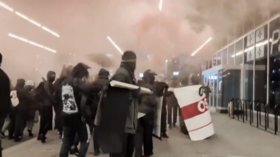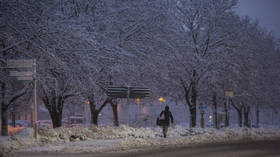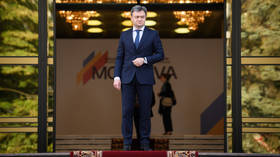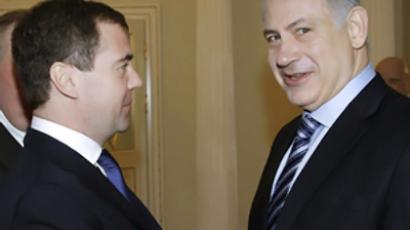Will US military get the boot from Kyrgyzstan?
US Congress heard testimony on Thursday suggesting that America tolerated a corrupt Kyrgyz government so as not to lose a critical military base that serves coalition troops in nearby Afghanistan.
On April 7, the capital of Bishkek erupted in deadly riots, eventually forcing President Kurmanbek Bakiyev, who took over power during the so-called Tulip Revolution in 2005, to flee the country – with an alleged $200 million (by comparison, there is reportedly just $80 million dollars left in Kyrgyzstan’s state budget). The political upheaval has forced Washington to examine, once again, the way it ignores the abuses of alleged tyrants as it continues to pursue terrorists.
Presently, the provisional Kyrgyz government is sending mixed messages concerning the future fate of the Manas base.
"We are not conducting any talks with the United States," acting Finance Minister Temir Sariyev said in Moscow on Friday when asked if the provisional government was discussing the future of the Manas base with the United States. "But we have stated clearly that we shall comply with all of the liabilities Kyrgyzstan assumed earlier."
"All issues will be discussed after the elections and the formation of a new, legitimate government," he added, as quoted by Itar-Tass. "The provisional government addresses exclusively the issues of security and stability, of day-to-day affairs and of the constitutional reform and elections."
Although Interim President Roza Otunbayeva has promised to uphold commitments made during the previous administration, analysts say that public opinion in Kyrgyzstan, which has been an unpredictable animal lately to say the least, would have tremendous influence on any final decision.
The United States has not forgotten the sting of being evicted from Uzbekistan in November 2005, after Washington joined international condemnation of a bloody government crackdown in Andijan that human rights groups claim killed hundreds of civilians. But if Washington fails to voice objections on human rights – in essence, turning a blind eye on one evil in order to defeat another – it risks condemnation both at home and abroad.
US performs congressional soul-searching
A panel of experts told the House Committee on Oversight and Government Reform that the United States ignored corruption and human rights abuses in Kyrgyzstan in order to keep its basing privileges in Manas, a logistical hub for supplying troops and weapons in Afghanistan.
Baktybek Abdrisaev, a former Kyrgyz ambassador to the United States, told the Congressional panel that Washington must prove that Kyrgyzstan means more to it than simply being "the Manas Transit Center.”
Abdrisaev suggested that the status of the Manas air base will become a major issue in the Kyrgyz presidential election, which is scheduled for October. He added that a number of candidates "will campaign on an anti-base platform."
Another speaker at the Congressional hearing was Alexander Cooley, associate professor at Barnard Collage and Open Society Institute Global Fellow, who said the popular perception amongst the Kyrgyz people is that the US supported the authoritarian rule of Bakiyev.
“Despite the intentions of US base commanders or the US Embassy in Bishkek, the perception among the Kyrgyz public and the political opposition was that the United States supported the authoritarian and corrupt rule of Bakiyev in order to maintain access to Manas,” Cooley said, before outlining how Bakiyev had reneged on pledges made following the Tulip Revolution.
“After the Tulip Revolution of 2005, Bakiyev quickly reneged on his pledges to enact
Constitutional reforms and tackle corruption,” he argued. “Instead he quickly established a criminal state, promoting family members to key government positions, and launched an assault on political opponents and the media, especially investigative journalists.”
It was noted that this year, Freedom House rated Kyrgyzstan as “Not Free” for the first time since the Tulip Revolution.
Perhaps the comment that struck the Congressional leaders the hardest was the revelation that the Russian-backed media in Kyrgyzstan was becoming increasingly critical of Bakiyev’s regime in the months before full-scale revolution rocked the central Asian country.
“US reluctance to criticize Bakiyev stands in stark contrast to how Moscow, and the Russian-backed press in Kyrgyzstan, launched a protracted media onslaught in recent months against Bakiyev’s repression, corruption and nepotism,” Cooley said, adding that “Russia’s critical bombardment resonated with the Kyrgyz public and provided a striking contrast to US official silence on these same domestic issues.”
Interestingly, the Kyrgyz people interpreted a visit by US President Barack Obama as hypocritical and nationally self-serving in light of recent events.
“Kyrgyz civil society and opposition figures were particularly disappointed that President Obama personally courted President Bakiyev last year in an attempt to save the base,” the associate professor said, “while the United States remained silent following Bakiyev’s highly-flawed presidential re-election in July 2009, which took place just weeks after the new basing agreement was announced in June.”
In the final analysis, problems will continue for the US forces in Kyrgyzstan unless it finds a way to make all transactions with government officials as transparent as possible. Until then, no government in the country is safe, and that means no military base as well.
It has been alleged that deposed President Kurmanbek Bakiyev enriched himself at the expense of his people by lining his pockets with money from fuel contractors, who reportedly had “significant financial dealings with the family of the deposed [president].”
"Two overthrows of the government there have been linked to corrupt dealings at Manas air base," said Rep. John F. Tierney (D- Mass.), chairman of the national security subcommittee of the House Committee on Oversight and Government Reform. "That's what we are looking into."
The House panel's inquiry centered on fuel deliveries to Bagram air base in Afghanistan, as well as a company called Red Star Enterprises, based in London. Tierney said that although Red Star has received almost $1 billion from the Pentagon's Defense Energy Support Center, the identity of the owner of the firm, which works as a broker for refineries in Turkmenistan and Azerbaijan, remains a mystery.
When Kurmanbek Bakiyev became president in 2005, he asked the FBI to help investigate allegations that the family of the deposed president, Askar Akayev, had enriched itself from subcontracts Red Star provided to a firm called Manas International Services. Political opponents allege that Bakiyev’s son, Maksim, became a main stockholder in Red Star's subcontractor.
On the one hand, Bishkek, the capital of Kyrgyzstan, would really hate to lose the $60 million annual rental fee and other alleged kickbacks that the Americans pay for basing privileges; on the other hand, the new government may come to the realization that risking another revolution over alleged corruption charges is just not worth the hassle.
Sam Patten, Senior Program Manager for Eurasia at Freedom House, quoting a passage from F. Scott Fitzgerald’s novel “The Last Tycoon”, told the House committee that “there are no second acts in American lives.”
Many people in Washington really hope Fitzgerald was wrong on this account, and there will be yet another chance for the US military to hang on to its basing privileges in Kyrgyzstan.












